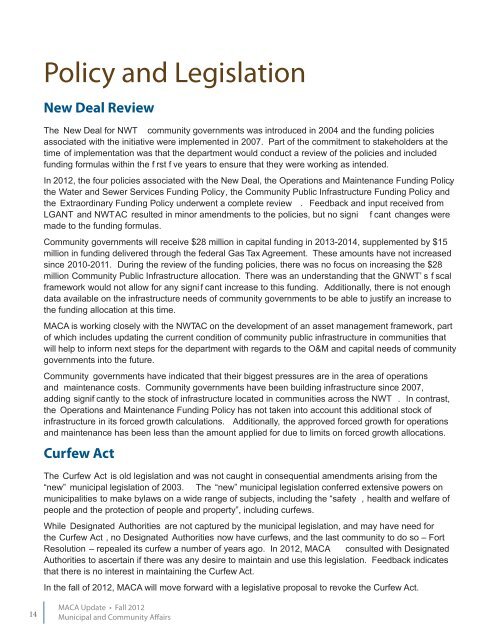MACA Update 2012 - Department of Municipal and Community ...
MACA Update 2012 - Department of Municipal and Community ...
MACA Update 2012 - Department of Municipal and Community ...
Create successful ePaper yourself
Turn your PDF publications into a flip-book with our unique Google optimized e-Paper software.
Policy <strong>and</strong> LegislationNew Deal ReviewThe New Deal for NWT community governments was introduced in 2004 <strong>and</strong> the funding policiesassociated with the initiative were implemented in 2007. Part <strong>of</strong> the commitment to stakeholders at thetime <strong>of</strong> implementation was that the department would conduct a review <strong>of</strong> the policies <strong>and</strong> includedfunding formulas within the f rst f ve years to ensure that they were working as intended.In <strong>2012</strong>, the four policies associated with the New Deal, the Operations <strong>and</strong> Maintenance Funding Policy,the Water <strong>and</strong> Sewer Services Funding Policy, the <strong>Community</strong> Public Infrastructure Funding Policy <strong>and</strong>the Extraordinary Funding Policy underwent a complete review . Feedback <strong>and</strong> input received fromLGANT <strong>and</strong> NWTAC resulted in minor amendments to the policies, but no signi f cant changes weremade to the funding formulas.<strong>Community</strong> governments will receive $28 million in capital funding in 2013-2014, supplemented by $15million in funding delivered through the federal Gas Tax Agreement. These amounts have not increasedsince 2010-2011. During the review <strong>of</strong> the funding policies, there was no focus on increasing the $28million <strong>Community</strong> Public Infrastructure allocation. There was an underst<strong>and</strong>ing that the GNWT’ s f scalframework would not allow for any signi f cant increase to this funding. Additionally, there is not enoughdata available on the infrastructure needs <strong>of</strong> community governments to be able to justify an increase tothe funding allocation at this time.<strong>MACA</strong> is working closely with the NWTAC on the development <strong>of</strong> an asset management framework, part<strong>of</strong> which includes updating the current condition <strong>of</strong> community public infrastructure in communities thatwill help to inform next steps for the department with regards to the O&M <strong>and</strong> capital needs <strong>of</strong> communitygovernments into the future.<strong>Community</strong> governments have indicated that their biggest pressures are in the area <strong>of</strong> operations<strong>and</strong> maintenance costs. <strong>Community</strong> governments have been building infrastructure since 2007,adding signif cantly to the stock <strong>of</strong> infrastructure located in communities across the NWT . In contrast,the Operations <strong>and</strong> Maintenance Funding Policy has not taken into account this additional stock <strong>of</strong>infrastructure in its forced growth calculations. Additionally, the approved forced growth for operations<strong>and</strong> maintenance has been less than the amount applied for due to limits on forced growth allocations.Curfew ActThe Curfew Act is old legislation <strong>and</strong> was not caught in consequential amendments arising from the“new” municipal legislation <strong>of</strong> 2003. The “new” municipal legislation conferred extensive powers onmunicipalities to make bylaws on a wide range <strong>of</strong> subjects, including the “safety , health <strong>and</strong> welfare <strong>of</strong>people <strong>and</strong> the protection <strong>of</strong> people <strong>and</strong> property”, including curfews.While Designated Authorities are not captured by the municipal legislation, <strong>and</strong> may have need forthe Curfew Act , no Designated Authorities now have curfews, <strong>and</strong> the last community to do so – FortResolution – repealed its curfew a number <strong>of</strong> years ago. In <strong>2012</strong>, <strong>MACA</strong> consulted with DesignatedAuthorities to ascertain if there was any desire to maintain <strong>and</strong> use this legislation. Feedback indicatesthat there is no interest in maintaining the Curfew Act.In the fall <strong>of</strong> <strong>2012</strong>, <strong>MACA</strong> will move forward with a legislative proposal to revoke the Curfew Act.14<strong>MACA</strong> <strong>Update</strong> • Fall <strong>2012</strong><strong>Municipal</strong> <strong>and</strong> <strong>Community</strong> Affairs

















